Role-playing students get perspective on patients' real-life struggles
Friday, May 3, 2019
Nursing students participated in a simulation in April that made them think about the choices they would make – and that many of their future patients will face – given the constraints of poverty.
During a “poverty simulation,” created by Missouri Community Action Network, students in a Community Health Nursing course were assigned to families with specified incomes and adhered to several rules: spending seven minutes of each 15-minute week at work (if they were employed); making sure children were cared for; paying for transportation to get to any destination; keeping their home secure and their utilities on; making loan payments; and providing adequate food, clothing and health care for their dependents.
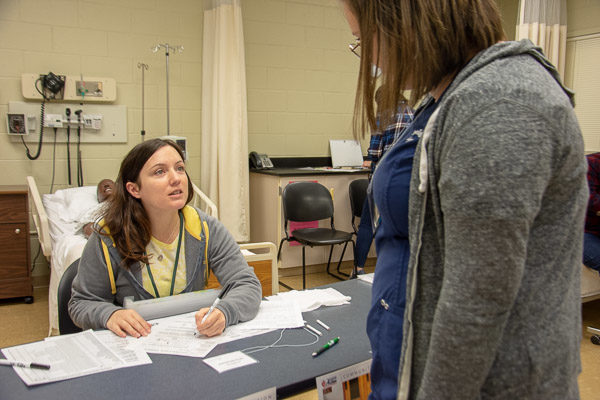 Meanwhile, nursing program faculty, staff and students, joined by community volunteers from the United Way and STEP Head Start, played the roles of banker, employer, superstore clerk, payday loan operator, pawn shop owner, community agency employee, social services employee, interfaith services director, health care provider, school teacher, utility bill collector and police officer.
Meanwhile, nursing program faculty, staff and students, joined by community volunteers from the United Way and STEP Head Start, played the roles of banker, employer, superstore clerk, payday loan operator, pawn shop owner, community agency employee, social services employee, interfaith services director, health care provider, school teacher, utility bill collector and police officer.
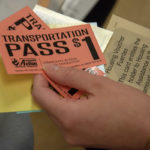 Some had disabled family members; one family was surprised with needing to provide glasses for a child; some told their children they could not participate in a school field trip because they could not both pay the fee and meet other obligations. Some were stuck at home waiting for spouses to earn a paycheck and purchase more transportation passes, while others had to stay home to care for children when they couldn’t attend their school’s field trip. Some could not cash their paychecks at the bank because they did not have accounts, and some could not get accounts because they were a credit risk.
Some had disabled family members; one family was surprised with needing to provide glasses for a child; some told their children they could not participate in a school field trip because they could not both pay the fee and meet other obligations. Some were stuck at home waiting for spouses to earn a paycheck and purchase more transportation passes, while others had to stay home to care for children when they couldn’t attend their school’s field trip. Some could not cash their paychecks at the bank because they did not have accounts, and some could not get accounts because they were a credit risk.
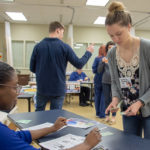 “I felt like there was no way out of poverty,” said student Emily L. Tashner-Thompson, of Muncy. “I asked the employer if there was opportunity to advance.”
“I felt like there was no way out of poverty,” said student Emily L. Tashner-Thompson, of Muncy. “I asked the employer if there was opportunity to advance.”
“We didn’t have money, so we just stole things,” another student said. Others, playing the roles of minors in their assigned family, found it difficult to go to school when they felt they could be helping their family.
“It was stressful, even though every part of this was fake, and I’m sitting here with a full belly and had my morning coffee,” said Dustin E. Neumann, a student from State College.
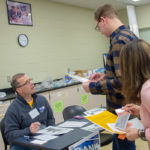 Poverty is an important topic, said Ronald A. Frick, president and CEO of the Lycoming County United Way, who played the role of banker. Frick explained that 40 percent of Americans struggle from paycheck to paycheck.
Poverty is an important topic, said Ronald A. Frick, president and CEO of the Lycoming County United Way, who played the role of banker. Frick explained that 40 percent of Americans struggle from paycheck to paycheck.
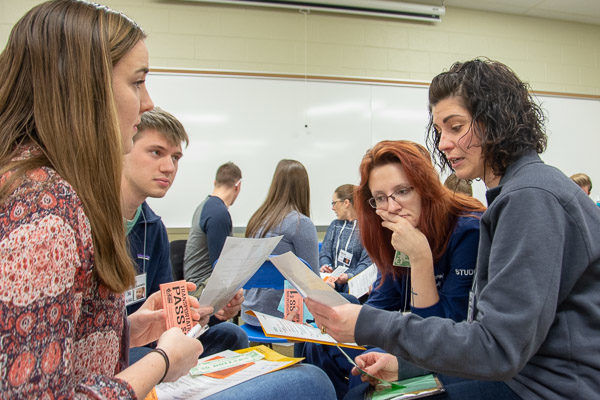 “That is 40 percent of your patients,” he said. “And now they will be in the hospital, not working. They are wondering who will take care of their kids? How will they pay their hospital bill?”
“That is 40 percent of your patients,” he said. “And now they will be in the hospital, not working. They are wondering who will take care of their kids? How will they pay their hospital bill?”
In addition to helping students understand the struggles their patients – or family members visiting their patients – might be facing, it also helped them to become aware of the resources available to help those who need it.
United Way’s vice president for community action, Brittany Fischer, emphasized that the future health care providers should be proactive in referring patients to those resources. Fischer played the role of a family member during the simulation.
For some of the students, the situation was very much like real life. They reported that they might be homeless today if someone hadn’t told them about the help available to them in this community.
During a “poverty simulation,” created by Missouri Community Action Network, students in a Community Health Nursing course were assigned to families with specified incomes and adhered to several rules: spending seven minutes of each 15-minute week at work (if they were employed); making sure children were cared for; paying for transportation to get to any destination; keeping their home secure and their utilities on; making loan payments; and providing adequate food, clothing and health care for their dependents.
 Meanwhile, nursing program faculty, staff and students, joined by community volunteers from the United Way and STEP Head Start, played the roles of banker, employer, superstore clerk, payday loan operator, pawn shop owner, community agency employee, social services employee, interfaith services director, health care provider, school teacher, utility bill collector and police officer.
Meanwhile, nursing program faculty, staff and students, joined by community volunteers from the United Way and STEP Head Start, played the roles of banker, employer, superstore clerk, payday loan operator, pawn shop owner, community agency employee, social services employee, interfaith services director, health care provider, school teacher, utility bill collector and police officer. Some had disabled family members; one family was surprised with needing to provide glasses for a child; some told their children they could not participate in a school field trip because they could not both pay the fee and meet other obligations. Some were stuck at home waiting for spouses to earn a paycheck and purchase more transportation passes, while others had to stay home to care for children when they couldn’t attend their school’s field trip. Some could not cash their paychecks at the bank because they did not have accounts, and some could not get accounts because they were a credit risk.
Some had disabled family members; one family was surprised with needing to provide glasses for a child; some told their children they could not participate in a school field trip because they could not both pay the fee and meet other obligations. Some were stuck at home waiting for spouses to earn a paycheck and purchase more transportation passes, while others had to stay home to care for children when they couldn’t attend their school’s field trip. Some could not cash their paychecks at the bank because they did not have accounts, and some could not get accounts because they were a credit risk. “I felt like there was no way out of poverty,” said student Emily L. Tashner-Thompson, of Muncy. “I asked the employer if there was opportunity to advance.”
“I felt like there was no way out of poverty,” said student Emily L. Tashner-Thompson, of Muncy. “I asked the employer if there was opportunity to advance.”“We didn’t have money, so we just stole things,” another student said. Others, playing the roles of minors in their assigned family, found it difficult to go to school when they felt they could be helping their family.
“It was stressful, even though every part of this was fake, and I’m sitting here with a full belly and had my morning coffee,” said Dustin E. Neumann, a student from State College.
 Poverty is an important topic, said Ronald A. Frick, president and CEO of the Lycoming County United Way, who played the role of banker. Frick explained that 40 percent of Americans struggle from paycheck to paycheck.
Poverty is an important topic, said Ronald A. Frick, president and CEO of the Lycoming County United Way, who played the role of banker. Frick explained that 40 percent of Americans struggle from paycheck to paycheck. “That is 40 percent of your patients,” he said. “And now they will be in the hospital, not working. They are wondering who will take care of their kids? How will they pay their hospital bill?”
“That is 40 percent of your patients,” he said. “And now they will be in the hospital, not working. They are wondering who will take care of their kids? How will they pay their hospital bill?”In addition to helping students understand the struggles their patients – or family members visiting their patients – might be facing, it also helped them to become aware of the resources available to help those who need it.
United Way’s vice president for community action, Brittany Fischer, emphasized that the future health care providers should be proactive in referring patients to those resources. Fischer played the role of a family member during the simulation.
For some of the students, the situation was very much like real life. They reported that they might be homeless today if someone hadn’t told them about the help available to them in this community.